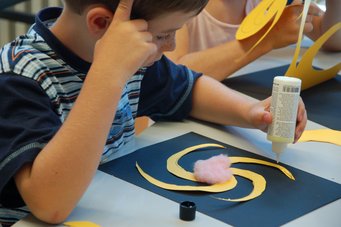Workshops for primary schools
Astronomy as a natural science offers ideal starting points for primary schools: It is a subject that can be experienced in the everyday lives of children, provides a link between all subjects at the primary school level and deals with many topics of the primary school education system and curricula.

In addition, it teaches classical scientific thinking and working methods such as observing, comparing, organizing, etc.
In order to these areas justice, our workshops consist of different sections:
- Exploring the planet path in the grounds of the Landessternwarte and the Max Planck Institute for Astronomy (about 1 hour)
- Break in one of the seminar rooms in the Haus der Astronomie (about 30 minutes)
- Astronomical main topic (about 45 minutes)
- Visit to a dome with a telescope in the grounds of the Landessternwarte (about 45 minutes)
Depending on the main topic, we offer the following three-hour workshops.
Our moon (Grades 1-4)
We embark on a journey to the moon, explore its size and distance, its appearance (phases of the moon) and how it affects our planet Earth. In addition, we look for craters, as well as the images of the rabbit and crocodile on the moon, and consider how they might have got there.
Our moon (Grades 1-4)
We embark on a journey to the moon, explore its size and distance, its appearance (phases of the moon) and how it affects our planet Earth. In addition, we look for craters, as well as the images of the rabbit and crocodile on the moon, and consider how they might have got there.
The Earth and its sun (Grades 1-4)
The sun is our closest star, which provides us with light and warmth. We will trace the occurrence of day and night, explore the emergence of the seasons together and build a sundial.
How many eyes does an alien need (grades 1-4)
What are aliens anyway and what do they look like? After looking at the diversity of the planets, we design our own aliens and examine what conditions in space they need to be adapted to. A short journey into the solar system (planetarium) leads us to the places where astronomers actually see possibilities for the existence of aliens.
Discovering the night sky (grades 3-4)
How can you remember all the constellations? We offer an introduction to navigating the sky with the help of stories and tips and tricks. Making a rotatable star chart helps us with this.
The life of stars (grades 3-4)
Red giants, white dwarfs and black holes: From the birth of a star until its death, it can experience a lot. What is the fate of our sun? And why is a black hole not a hole in the true sense of the word? We aim to shed some light on these questions.
A journey through the Universe (grades 1-4)
Our in-house planetarium gives us the opportunity to take the children on an interactive journey to the planets with their moons and even further to the stars and galaxies.
If you have questions or are interested in a workshop and would like to arrange a date, please contact us via email. The contact person is Natalie Fischer.
